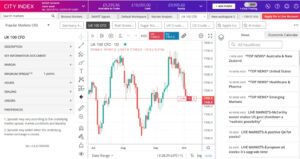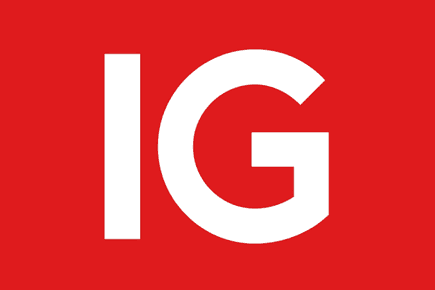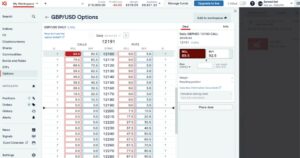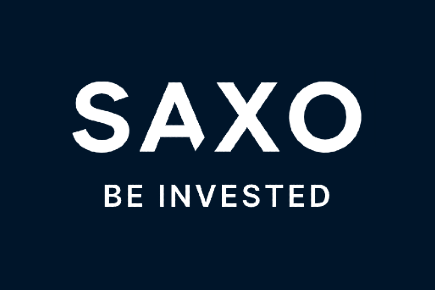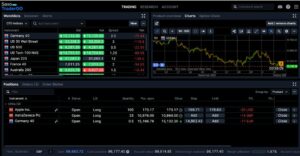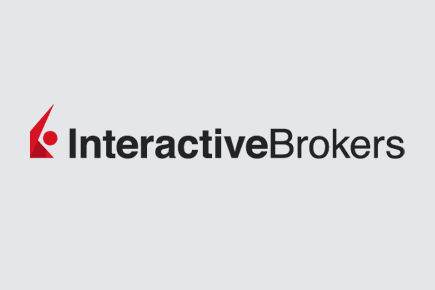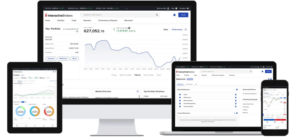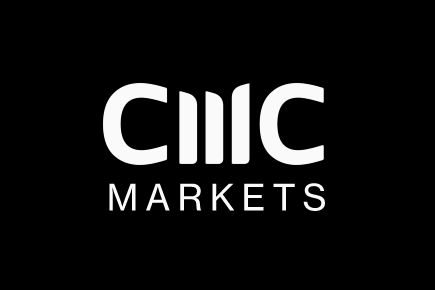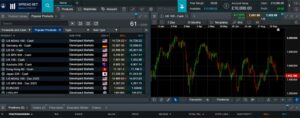Options are one of the most complex financial instruments to speculate with. But if you are comfortable with the level of risk involved, and they work for your financial goals, which are the best options trading platforms to use?
To compile this list, I’ve gone through the onboarding process and comprehensively tested all of the trading platforms listed. I’ve set up accounts and trialled demo platforms, compared their service charges, made requests through customer service, and extensively explored mobile apps, desktop apps, and websites.
Featured Trading Platform

80% of retail CFD accounts lose money
Global Markets
- User friendly mobile app
- Excellent CFD broker
- Tight spreads
Best for low cost and choice of options
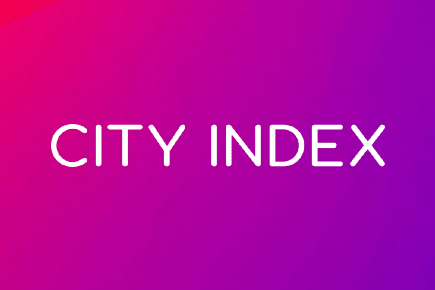
Capital at risk. T&Cs apply.
Access 40+ options markets
- Access to MetaTrader 4
- Great trading platforms
- Low-cost trading platform
Best overall platform

Capital at risk. T&Cs apply.
Established since 1974
- Easy to use platform
- 24 hour support
- 17,000 markets
My best rated options trading platforms in the UK, July 2025
- Plus 500 – One of the best for trading options
- City Index – Best for beginners and mid-level traders
- IG – Best for overall trading platform
- AvaTrade – Best for trading platform choice
- Saxo – Best for traders with a larger portfolio
- Interactive Brokers – Best for low cost and choice of options
- CMC Markets – Best for spread betting
Trusted partner

80% of retail CFD accounts lose money
2000+ CFDs
- User friendly mobile app
- unlimited CFD demo account
- Trading academy
Trusted partner
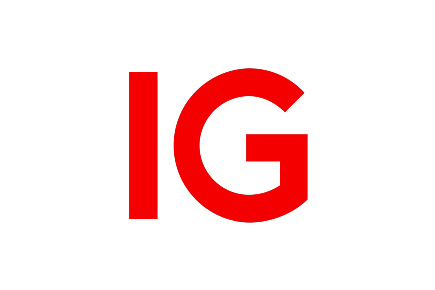
71% of traders lose money trading with IG.
Commission-free trading
- Free demo account
- Advanced charting tools
- Extensive educational content
Plus500 is a publicly-traded online multi-asset broker offering an extensive range of financial products, including CFD trading (forex CFDs, indices CFDs, shares CFDs, commodities CFDs, EFTs CFDs, and options CFDs)
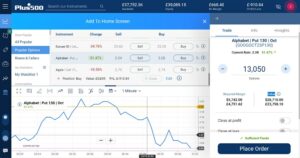
Key features
- 2000+ trades across commodities CFDs, ETFs CFDs, indices CFDs, options CFDs, and shares CFDs.
- Trading for call and put options CFDs on Germany 40, oil, and Metashares
- Up to 1:30 leverage (depending on classification) with a minimum £100 investment.
- Lower capital requirements due to leverage, zero commissions, and competitive spreads.
- Analytical tool ‘Insights’ for trade analysis and sentiment
- Risk management tools include price alerts, stop-loss orders, and negative balance protection.
- Demo account with £40,000 virtual credit for learning options trading
Pros:
- Access to over 2800 contracts
- no commissions, spreads and other fees apply
- Excellent risk management tools
Cons:
- Only offers options trading in contracts
- Plus500 does not offer MetaTrader 4 (MT4)
- Inactivity fees levied, making the platform unsuitable for buy-and-hold investors
Service Fees:
- Buy/Sell Spreads: Plus500’s receives commission on the spread (the difference) between a buy and sell price. Check the website for full details.
- Overnight funding: An overnight funding fee is due when holding a position after a certain time. Check the website for full details.
- Guaranteed Stop Order: There is a fee due for using a Guaranteed Stop Order. Check the website for full details.
- Deposit / Withdrawal fees: No deposit or withdrawal fees.
- Inactivity fee: Inactivity fee is $10 per month after 3 months of inactivity.
- Currency conversion: Currency conversion fee is 0.7%.
Investment Types:
- Commodity CFDs
- ETF CFDs
- Indices CFDs
- Options CFDs
- Shares CFDs
Best for:
Those looking to trade options CFDs with leverage.
CFDs are complex instruments and come with a high risk of losing money rapidly due to leverage. 80% of retail investor accounts lose money when trading CFDs with this provider. You should consider whether you understand how CFDs work and whether you can afford to take the high risk of losing your money.
City Index is a low-cost, well-established trading and spread betting platform that provides access to more than 40 options markets, with daily, monthly, and quarterly contracts on offer. City Index is part of the NASDAQ-listed StoneX group.
Key Features
- Access 40+ options markets in indices, FX, metals, and commodities
- Quality news feeds from Reuters and in-house research
- Economic calendar and social media presence for retail investors
- Choice of trading platforms, including Metatrader 4 (MT4)
- Beginner-friendly educational resources
- Powerful research tools for market understanding
- Comprehensive trading tools and market news from Reuters
Pros:
- Low-cost trading platform
- Great choice of assets
- Excellent education and research tools
- Great customer support
Cons:
- No MetaTrader 5
- Inactivity fee applied
Service Fees:
- Buy/Sell Spreads: Rather than charging commission, City Index’s charges are incorporated into the spread. You’ll need to open an account (or demo account) to see spreads on their 1,000s of markets but, depending on the market, both fixed and variable spreads are offered. These start at margins from 5% and fixed spreads from 0.4pts.
- Commission: There is no commission on spread betting markets. With CFDs, you’ll only pay commission when trading shares. Commission for these trades is typically 0.08%.
- Overnight funding: Overnight financing fees on both long and short positions are 2.5% +/- the benchmark regional interest rate.
- Guaranteed Stop Order: A charge is made for use of this feature. For full details, check the website.
- Deposit / Withdrawal fees: No charges.
- Inactivity fee: A monthly inactivity fee of £12 will be applied for accounts that are inactive for 12 months or more.
- Currency conversion: Spread betting accounts are not affected because all trades take place in one base currency, usually sterling. Fees apply on CFDs. Check the website for full details.
- Borrowing costs for shorting CFDs: Borrowing costs are incurred when you short a shares CFD position. Very few markets will incur a borrowing charge – check the relevant market information sheet for details.
Investment Types:
- Indices
- Shares
- Forex (FX)
- Commodities
Best for:
City Index is a good option for beginners and mid-level traders seeking an uncomplicated platform from which to access CFDs and spread betting.
CFDs are complex instruments and come with a high risk of losing money rapidly due to leverage. 71% of retail investor accounts lose money when trading CFDs with this provider. You should consider whether you understand how CFDs work, and whether you can afford to take the high risk of losing your money.
IG is a British-run online trading provider offering financial derivatives, including spread betting and stockbroking, to retail investors from across the globe. IG was established in 1974 and can lay claim to inventing spread betting, bringing it to the market that same year.
Key Features
- Proprietary web and mobile platforms for spread bets, trading, and share dealing.
- Features: Clear, responsive, chart analysis, custom alerts, automatic trading, research tools, streaming news, economic calendar, signals.
- Progressive web app (PWA) for platform access on any device without app store visit.
- ProRealTime (PRT) and MT4 also available.
- Access to 17,000+ markets.
- Risk management tools: Stop-losses, price and distance alerts, visible balances, guaranteed stop-loss orders (GSLOs).
- Option chain for expirations, calls, puts, and trading.
Pros:
- Fantastic trading platform which is easy to customise
- Some of the best educational resources available
- Unlimited demo account
- Multiple options for funding and withdrawing money
- Customer support is available 7 days a week
Cons:
- Trading platform may be too complex for beginners
- No copy trading or backtesting integration
- Not optimal for infrequent traders
Service Fees:
- Buy/Sell Spreads: Trade with spreads from 0.6 points on key FX pairs, 0.8 points on major indices, and 0.1 points on commodities. Check the website for full details.
- Overnight funding: If directly-funded positions are open past 10pm, you’ll be charged an overnight funding fee. Check the website for full details.
- Guaranteed Stop Order: You can protect your position against slippage with a guaranteed stop, paying only a small premium if your guaranteed stop is triggered. The potential premium is displayed on your deal ticket.
- Deposit / Withdrawal fees: IG do not charge any deposit or withdrawal fees.
- Inactivity fee: £12 every month if you’ve not used your account to deal for two years or more.
- Currency conversion: Standard charge for currency conversion on CFDs is 0.5%.
Best for:
Trading forex options.
Spread bets and CFDs are complex instruments and come with a high risk of losing money rapidly due to leverage. 71% of retail investor accounts lose money when trading spread bets and CFDs with this provider. You should consider whether you understand how spread bets and CFDs work, and whether you can afford to take the high risk of losing your money.
Saxo Markets is the London-based institutional division of Denmark’s well-respected Saxo Bank Group. They provide access to the options market alongside other multi-asset trading and investment opportunities in the global capital markets. Saxo launched one of the first online trading platforms in 1998 and has operated in the UK since 2006.
Key Features
- Trade options on equities, indices, foreign exchange, bonds, and commodities on 23 stock exchanges worldwide.
- Standard option trading allows buying only to control risk.
- To buy options, you need an account value of over $5,000 and must acknowledge the risks.
- Saxo offers powerful platforms like SaxoTraderPRO and SaxoTraderGO with advanced features, risk management tools, and integration options.
- Access market analysis, webinars, news, and education resources.
- Real-time option chain for easy trading decisions.
Pros:
- Access to one of the largest pools of assets available
- Superb trading tools
- One of the best available desktop platforms
- For those with £1m+ to trade, VIP tier comes with many benefits
- Excellent, up-to-date research
- Very large virtual credit wallet to practise with on the demo account
Cons:
- Beginners are only allowed to buy (rather than sell) of options
- Demo account limited to 20 days
- Saxo Markets does not offer MetaTrader 4 (MT4)
- Trading with leverage is risky as your losses may exceed your initial outlay
- Service Fees
Investment Types:
Trade options on:
- Indices
- Shares
- Forex (FX)
- Commodities
- Futures
- Bonds
- Interest rates
Best for:
More experienced traders with large portfolios.
67% of retail investor accounts lose money when trading CFDs with this provider. You should consider whether you understand how CFDs, or any of our other products work, and whether you can afford to take the high risk of losing your money. The value of your investments can go down as well as up. Losses can exceed deposits on some margin products. Professional clients can lose more than they deposit. All trading carries risk.
Boasting access to more than 150 markets, Interactive Brokers (IBKR) has become a popular choice for options investors. Founded in 1978, IBKR is publicly listed on the NASDAQ and is regulated in 9 Tier-1 jurisdictions.
Key Features
- Access 10,000+ options markets, including major exchanges
- Five trading platforms available for retail and professional options traders
- Four levels of options trading permissions available
- No minimum account threshold or inactivity fee
- Rich education and research toolkit, including ‘Options Wizard’
- Full suite of risk management tools, including Stop Limit and Trailing Stop
Pros:
- Ultra-low fees – one of the lowest cost platforms available
- Unparalleled choice of investment assets
- Impressive selection of features on Trader Workstation (TWS) means you can trade like a professional
- No inactivity fee
Cons:
- The exceptional tools on TWS and the breadth of assets available could be intimidating for inexperienced traders
- MetaTrader 4 (MT4) not available
- Trading with leverage is risky as your losses may exceed your initial outlay
Service Fees:
Interactive Broker implements a more simple charging structure than many of its competitors: fees are earned through commission with no added spreads, ticket charges, platform fees or account minimums to worry about.
- Buy/Sell Spreads: n/a
Commission:
- Fixed rate pricing charges a flat rate per contract, e.g., £1.70 per contract for index options.
- For those trading in large volumes or adding liquidity, the Tiered structure is usually more cost-effective. It starts at £0.60 per contract for index options, with potential reductions to £0.15 for high-volume traders (additional fees may apply).
- CFDs have a combination of fixed and volume-tiered pricing, with full details available on the website.
Overnight funding: Overnight position fees apply. Check the website for full details.
Deposit / Withdrawal fees: IBKR allows one free withdrawal request every month. After the first withdrawal (of any kind), IBKR will charge fees for any subsequent withdrawal.
Inactivity fee: No fee.
Currency conversion: IBKR typically adds or subtracts (at its discretion) 0.03% to the exchange rate that would otherwise apply. This is far lower than any other options trading brokers I have experienced.
Investment Types:
- Stocks
- ETFs
- Futures
- Option
- sport currencies
- Cfds
- Metals
- Bonds
Best for:
Experienced and professional traders looking for a feature-rich options trading platform.
Capital at risk.
CMC Markets is a global provider of financial spread betting and trading. Headquartered in the City of London and listed on the London Stock Exchange, CMC Markets has offices in Sydney, Singapore, Toronto, and across Europe.
Key Features
- Highly regarded and listed on the London Stock Exchange.
- Caters to all trader levels, with educational resources and advanced tools.
- Offers tax-free spread betting on 12,000+ instruments.
- User-friendly website with extensive resources.
- Features its proprietary platform, Next Generation, and MetaTrader 4.
- Provides risk management tools, including guaranteed stop-loss orders (GSLOs).
Pros:
- Accessible, easy-to-use platform for all trading competency levels
- Platform offers some excellent features
- Low cost and clear fees
- Great educational offering
Cons:
- You cannot trade real stocks or ETFs
- Stock fees are high
- Inactivity fee applied
Service Fees:
- Income from spread on buy/sell prices, details on website.
- Overnight holding costs for CFD and spread betting positions are detailed details on website.
- Fee for Guaranteed Stop Order, displayed in trade ticket; refunded if not triggered, details on website.
- No fees for credit/debit card or standard bank transfer withdrawals; charges for international bank transfers may apply.
- Inactivity fee of £10/month on dormant accounts after one year (no deduction if no funds).
- No currency conversion fees for spread betting.
Investment Types:
Options available on over 50 currency pairs, Gold, and Silver. CFD and spread betting available on 12,000+ products including FX Pairs, Indices, Commodities, Shares, Cryptocurrencies, and Treasuries.
Best for:
Suitable for a wide range of options traders including beginners and experienced investors.
Spread bets and CFDs are complex instruments and come with a high risk of losing money rapidly due to leverage. 69% of retail investor accounts lose money when spread betting and/or trading CFDs with this provider. You should consider whether you understand how spread bets and CFDs work and whether you can afford to take the high risk of losing your money.
5 steps to trading options in the UK
- Choose an options trading platform or broker. My list above includes the top 10 options trading platforms available to UK investors. If you intend to use a different broker, make sure they offer access to options, as not all platforms will do so.
- Open an account. A regular share dealing account will typically be the most suitable for options trading.
- Deposit funds. Many platforms have a minimum deposit requirement. Check what this is before you go to open an account.
- Decide what kind of options you’d like to trade. You can trade options on a variety of assets, and there are various ways to do so. Keep reading my guide to discover more about how to trade options.
- Place your trades. You’re ready to trade! Remember to keep an eye on your options and make any adjustments or decisions before the expiration date of the contract.
What is options trading?
Options trading is a type of contract that gives you the right to buy or sell an asset at a specified price on or before a particular date.
So for example, if you thought that a stock was going to increase in value, you could buy an options contract on it at a fixed price now.
In return for this options contract, you’ll need to pay a premium, usually charged for each share or unit of the underlying asset that the contract covers. As it often is for stock trading, there will be a “bid” price and an “ask” price, the latter of which you’ll need to pay as your premium.
Then, if the company did increase in value, you could exercise your option on it at the lower price, allowing you to buy the stock at a cheaper value than it’s now worth.
The keyword in the definition is the word “right”, as you have the choice, not the obligation, to do so. Indeed, you are fully entitled not to make use of the price of the option contract if you no longer want to do so.
You may do this if the asset had fallen in value instead. Rather than having bought the asset for a higher price and seeing it lose value, you could allow the contract to expire and not buy shares that have subsequently dipped.
Of course, you will still have to pay the premium as agreed at the start. Even so, this may be a lower cost than the value you would have lost had you bought the asset in the first place.
In this way, options trading is almost like buying insurance on your investments, as you are protecting yourself from investments moving in unexpected directions. Instead of being exposed to this, you have a contract in place that guarantees the price you will receive for your asset.
6 key definitions you need to know when options trading
In a moment, I’ll show you an example of how an options trade works. But first, it’s important to understand these six key definitions that you’ll almost certainly come across when trading options.
Call option
With a call option, you are able to buy an asset at the agreed price before a certain date. You might do this if you thought the asset was going to increase in value.
Put option
With a put option, you are able to sell an asset at the agreed price before a certain date. In this instance, you would do this because you thought the asset was going to decrease in value.
Strike price
The strike price is the agreed price of the option contract.
Expiration date
The expiration date is the specified date in the option contract when it will expire and you’ll no longer be able to buy or sell your stock (or other asset) for the agreed price. The maximum expiration date can be anything from overnight all the way to a year, although this will vary from broker to broker.
In the money
An option contract is considered “in the money” (ITM) when the asset price exceeds the strike price before or on expiration.
Out the money
Conversely to being ITM, “out the money” (OTM) means the strike price now exceeds the price of the asset, essentially rendering the contract useless.
Examples of options trading
Now that you understand those six key terms, you can look at these examples of options trading to see how it all might work in practical terms.
Please note: these figures are not necessarily representative of what’s really happening in the market or what would happen if you placed these trades. These are purely illustrative and any profits or losses you incur could be greater or smaller than this.
An example of a call option
Firstly, consider this example of a call option.
Let’s imagine that Tesco shares are trading for £160. You’ve heard that there’s going to be a big announcement this week about the way the supermarket is trading, which you think will drive Tesco shares up to £200 by the end of the month.
So, rather than buying shares now, you buy a call option on Tesco shares with an expiration date of 30 days. You’re given a strike price of £170, meaning you’ll have the right to buy Tesco shares at this price no matter what happens.
You find Tesco shares on your options trading platform and see that the “ask” price is £3. As a single contract typically represents 100 shares, that means your premium is going to be £300.
Over the next 30 days, Tesco shares do indeed reach £200. So, you exercise your right lined out in the contract and make the purchase at the £170 strike price – making the contract “in the money”.
That means you buy shares that are worth £20,000 for £17,000, netting you a tidy return of £3,000. Meanwhile, your outgoings are just £300 for the premium, giving you total gains of £2,700.
Now consider what would have happened if your prediction for Tesco shares had been wrong. Rather than rising to £200, imagine they fall to £100. Your contract is now “out the money”, as the asset price is below the strike price.
If you exercise your call option for 100 shares at £170, totalling £17,000, your shares would now be worth £10,000 – a loss of £7,000.
Fortunately, you are not obligated to exercise the call option. That means you can let this expire without buying Tesco shares. In this instance, while you lost the £300 you paid for the call option, you insulated yourself from losing value on the entire investment.
An example of a put option
Now let’s see how a put option might work. With a put option, you’re protecting yourself against falling prices.
In this case, imagine that you already have 100 Tesco shares, which you bought for £160 (£16,000 in total). However, you now think there’s a chance your shares will fall to be worth £100 each, or £10,000 in total, by the end of the month.
So, you purchase a put option with a strike price of £160, expiring in 30 days. This time, the premium ask price was £5, totalling £500 for all the shares.
As you predicted, the shares fall in value to £100. Without your option contract, you would have lost £6,000 on your investment, as your 160 shares worth £16,000 would now only be worth £10,000.
Instead, your put option allows you to sell at the agreed strike price of £160. That means you won’t lose value on your initial investment — just the £500 you had to pay to take out the put option.
Conversely, if Tesco shares rise to £180, your investment is now worth £18,000 – a profit of £2,000. In this case, you don’t have to exercise the put option, as it is not an obligation.
So, you then lose the £500 from a put option you no longer need, giving you total returns of £1,500.
In this instance, it was very much like insurance: you protected yourself and your investment from losses, paying a premium in return.
You can spread bet or trade on options contracts
Rather than taking out options yourself, you can spread bet or trade on them. Indeed, some investment platforms will exclusively offer access to options through these derivatives.
Brokers that allow you to do this include:
Please remember: Trading and spread betting are complex financial instruments and you may get back less than you invested due to leverage. Your broker is obligated to tell you how many retail investor accounts lose money when trading with them, so take note of this figure as it indicates just how much risk you are taking on.
You can sell an options contract to another buyer
Alternatively, rather than exercising the option you have taken out in the event that your speculation was correct, you are also free to sell options contracts before the expiration date.
For example, if you bought a call option on a stock that subsequently rises in value, you could sell the option for a premium to another buyer before it expires.
The value of an options contract often declines the closer it gets to expiry. So, if the underlying asset has not moved or even shifted in the wrong direction relative to the contract, you could look to sell it first.
This offers you another way to make money trading options, other than exercising the right you have to buy at a certain price. You could even speculate on the value of assets and take out options contracts accordingly, selling the contract for more than you paid for it to investors who want to buy the asset at the strike price in your contract.
What causes options to rise or fall in price?
There are many factors that can cause options to rise or fall in value, but three common ones include:
- Price movements of the underlying asset – the value of the contract will vary depending on the performance of the underlying asset. For example, if the option is for a stock that has risen in value, the contract will likely increase in value too.
- Time to expiration – generally, options will lose value the closer the contract moves towards expiry.
- How volatile the underlying asset is – more volatility means greater risk for the contract issuer. As a result, this will affect how much the contract is issued for, and what it’s worth as the asset rises and falls in value.
Assets you can access through options trading
You can trade options on a huge variety of trading instruments across the financial markets. Below are just a handful of the different assets you can trade:
- Stocks and shares
- Funds, such as index and mutual funds
- Commodities, such as oil
- Metals, such as gold and silver
- Foreign Exchange
With such a wide variety of assets available, this can make options trading a flexible investment strategy.
Options trading strategies
Now that you know what options are and how they work, you might be wondering about some of the strategies you can use to trade on them. Read about four options trading strategies below.
Remember: these are general strategies, not personalised recommendations. If you want to become an options trader, you’ll need to develop a trading strategy that works for you.
Covered call
One of the most popular options strategies, a “covered call” involves buying a certain asset and then selling a call option to another investor on the same one.
You might do this if you thought that the price of your asset was going to remain stable in the short term, and were looking to generate a small return from the premium while you wait for it to do so. It also protects against the underlying asset losing value, as you receive the premium even if it does.
Of course, the risk here is that the asset does increase in value and your buyer exercises their option. In that case, you would have to sell your asset to them for the strike price.
Married put
This options strategy involves buying an asset and then buying a put option of equal value on that asset.
As I mentioned earlier, this is comparable to insurance, protecting yourself from short-term losses by ensuring you have an option to sell at the original price if an asset you think will rise in value actually decreases instead.
Long straddle
With a long straddle, you buy a put option and a call option on the same asset with the exact same strike price and expiration date.
You would do this if you thought that an asset was going to move one way or another, but weren’t sure which way. By doing so, you’d be hoping that returns, either positive or negative, will outweigh the premiums you pay for the options.
Pros and cons of options trading
Having trouble deciding whether options trading is right for you? I’ve collated a few short pros and cons to help you weigh up your decision.
What are the advantages of options trading?
-
Your risk is set from the start when buying options
One of the most useful features of an options contract is that your risk, and consequently the maximum amount of money you can lose, is set from the start.
The contract issuer must honour the agreed strike price. So, regardless of how an asset moves, the ability to exercise your option means the maximum you can lose on a trade is set at the premium of the contract.
-
Access a wider range of investments
With options, you are speculating on the future value of an underlying asset before you’ve actually purchased it.
This means you can access the potential value of an underlying stock, fund, bond, commodity, or whatever asset it is, without actually having to put your money in the market.
What are the disadvantages of options trading?
-
Options trades are complex instruments
Options trading is complex, with so many concepts and different pieces of jargon that you need to understand.
As a result, it may only be suitable for intermediate and advanced traders who fully understand how to trade.
Many brokers may only give you access to options trading once you have proved that you understand how these work.
-
Leverage could see you exposed to greater losses
Depending on which broker you choose, you may have access to leverage with your options trades.
While this does afford you the ability to make larger trades with the potential for greater gains, it also means any losses you incur will be magnified too.
Make sure you understand the risk that leverage can present before you invest.
Best Options Trading Platforms UK FAQs
Can you do options trading in the UK?
What apps can I trade options with UK?
Can I trade options on eToro?
Can I trade options on Hargreaves Lansdown?
Please note
The value of your investments (and any income from them) can go down as well as up and you may not get back the full amount you invested. Past performance is not a reliable indicator of future performance. Investments should be considered over the longer term and should fit in with your overall attitude to risk and financial circumstances.
CFDs are complex instruments and more than half of retail investor accounts lose money when trading CFDs. Please make sure that you know these risks before you start trading and that you’re aware there’s a high chance of losing money rapidly on your investment.


